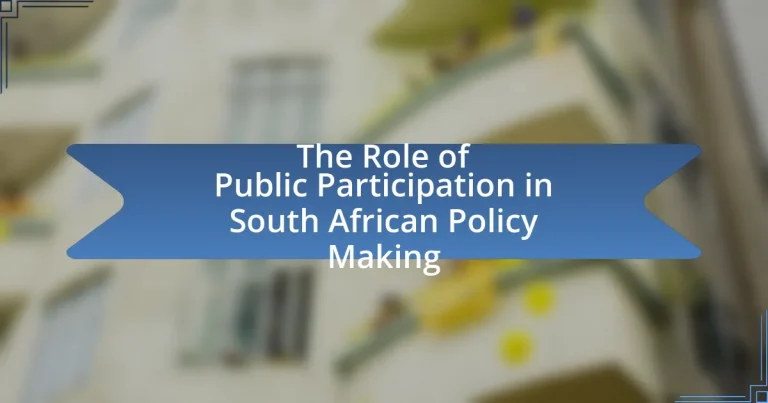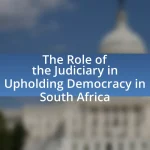Public participation is a fundamental aspect of policy making in South Africa, ensuring that citizens have a voice in governance and decision-making processes. The article explores the significance of public participation in enhancing transparency, accountability, and legitimacy in policy formulation, as mandated by the South African Constitution. It outlines the historical evolution of public participation since the end of apartheid, the mechanisms and principles that facilitate citizen engagement, and the challenges faced in achieving effective participation. Additionally, the article discusses best practices and future prospects for public involvement in policy making, emphasizing the role of technology and civil society organizations in fostering inclusive governance.
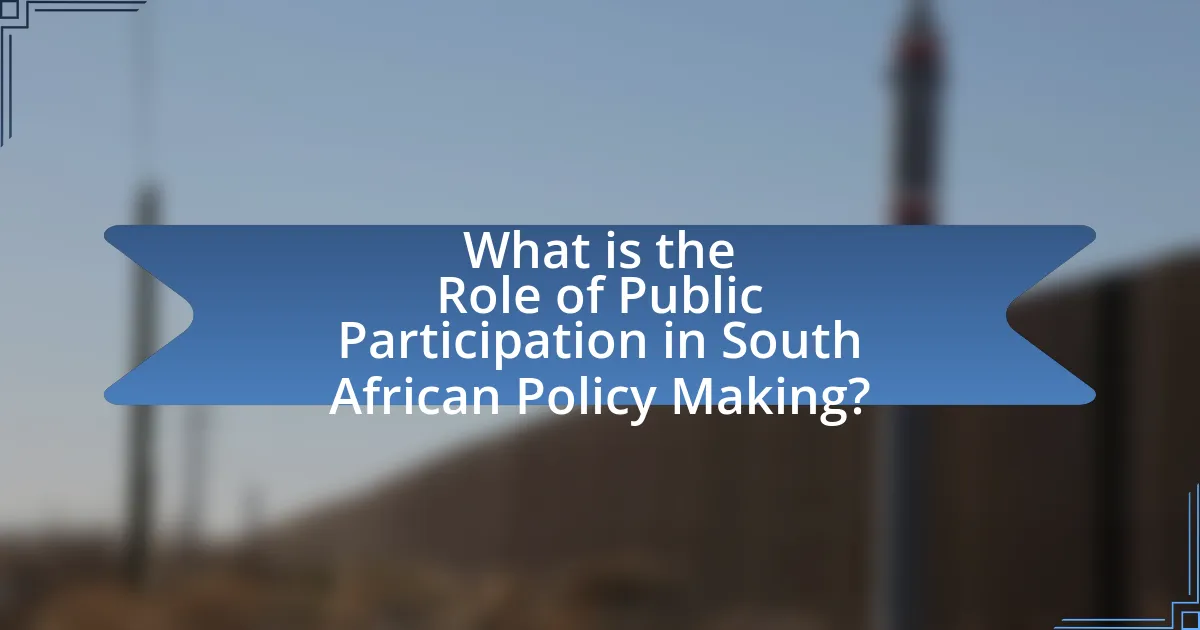
What is the Role of Public Participation in South African Policy Making?
Public participation plays a crucial role in South African policy making by ensuring that citizens have a voice in the decision-making process. This involvement enhances transparency, accountability, and legitimacy in governance, as it allows for diverse perspectives to be considered in policy formulation. The South African Constitution emphasizes public participation, particularly in Section 195, which mandates that public administration must be governed by democratic values and principles. Furthermore, the White Paper on Transforming Public Service Delivery (1997) highlights the importance of engaging citizens to improve service delivery and responsiveness. By incorporating public input, policymakers can create more effective and inclusive policies that reflect the needs and priorities of the community.
Why is public participation important in policy making?
Public participation is important in policy making because it enhances the legitimacy and effectiveness of policies. Engaging citizens allows policymakers to gather diverse perspectives, ensuring that the needs and concerns of the community are addressed. Research indicates that policies developed with public input are more likely to be accepted and successfully implemented, as they reflect the values and priorities of the population. For instance, a study by the South African Human Sciences Research Council found that inclusive policy processes lead to better governance outcomes and increased public trust in government institutions.
What are the key principles of public participation?
The key principles of public participation include inclusiveness, transparency, accountability, and responsiveness. Inclusiveness ensures that diverse voices, particularly marginalized groups, are represented in the decision-making process. Transparency involves providing clear and accessible information about policies and processes, allowing the public to understand and engage meaningfully. Accountability requires that decision-makers are answerable to the public for their actions and decisions, fostering trust in the process. Responsiveness means that the input from the public is genuinely considered and integrated into policy decisions, demonstrating that public contributions have a tangible impact. These principles are essential for effective public participation, as they enhance democratic governance and improve policy outcomes.
How does public participation enhance democratic governance?
Public participation enhances democratic governance by fostering transparency, accountability, and inclusiveness in decision-making processes. When citizens actively engage in governance, they contribute diverse perspectives that inform policy development, ensuring that the needs and interests of various communities are represented. Research indicates that public participation can lead to more effective policies; for instance, a study by the World Bank found that participatory governance initiatives in South Africa improved service delivery outcomes by 20%. This evidence underscores the importance of involving the public in governance to create policies that are not only more equitable but also more responsive to the populace’s needs.
What are the historical contexts of public participation in South Africa?
Public participation in South Africa has evolved significantly, particularly influenced by the country’s transition from apartheid to a democratic society in the 1990s. The end of apartheid in 1994 marked a pivotal moment, as the new democratic government emphasized inclusive governance and citizen engagement in policy-making processes. The 1996 Constitution of South Africa further institutionalized public participation by mandating that government must be accountable to the people, thereby establishing frameworks for public involvement in decision-making.
Historically, public participation was largely suppressed during apartheid, where the majority of the population was excluded from political processes. The struggle against apartheid saw various forms of public engagement, including protests and community organizing, which laid the groundwork for future participatory mechanisms. The establishment of the National Economic Development and Labour Council (NEDLAC) in 1994 exemplified the commitment to include diverse stakeholders in economic policy discussions.
The 2000 Municipal Systems Act also played a crucial role by requiring municipalities to develop Integrated Development Plans (IDPs) that involve community input, thus formalizing public participation at the local government level. This legislative framework reflects a broader historical context where public participation is not only a democratic ideal but also a legal requirement, ensuring that citizens have a voice in shaping policies that affect their lives.
How has public participation evolved since the end of apartheid?
Public participation in South Africa has significantly evolved since the end of apartheid, transitioning from a largely exclusionary system to a more inclusive democratic framework. Following the 1994 democratic elections, the new government implemented policies aimed at enhancing citizen engagement in governance, such as the establishment of the Municipal Systems Act of 2000, which mandates public participation in local government decision-making processes. This legal framework has facilitated the involvement of diverse communities in policy formulation and implementation, allowing for greater transparency and accountability. Additionally, the rise of civil society organizations and community forums has further empowered citizens to voice their concerns and influence policy outcomes, reflecting a shift towards participatory democracy.
What role did public participation play in the drafting of the South African Constitution?
Public participation was crucial in the drafting of the South African Constitution, as it ensured that the voices of diverse communities were heard and incorporated into the legal framework. The Constitutional Assembly conducted extensive public consultations, including hearings and workshops, which allowed citizens to express their views on fundamental rights and governance. This participatory approach was instrumental in shaping key constitutional principles, such as equality, human rights, and democratic governance, reflecting the aspirations of a society emerging from apartheid. The involvement of various stakeholders, including civil society organizations and marginalized groups, further validated the legitimacy of the Constitution, making it a product of collective national consensus.
What mechanisms exist for public participation in South African policy making?
Public participation in South African policy making is facilitated through several mechanisms, including public consultations, participatory budgeting, and the establishment of forums for stakeholder engagement. Public consultations allow citizens to provide input on proposed policies and legislation, often through public meetings or written submissions. Participatory budgeting enables communities to influence budgetary decisions, ensuring that local needs are addressed. Additionally, forums such as the National Economic Development and Labour Council (NEDLAC) bring together government, business, and labor representatives to discuss and negotiate policy matters, enhancing collaborative decision-making. These mechanisms are supported by the South African Constitution, which emphasizes the importance of public involvement in governance.
What are the formal channels for public input in policy processes?
Formal channels for public input in policy processes in South Africa include public consultations, written submissions, and participation in parliamentary hearings. Public consultations allow citizens to engage directly with policymakers, while written submissions enable individuals and organizations to provide feedback on proposed legislation or policies. Parliamentary hearings offer a platform for stakeholders to present their views and influence decision-making. These channels are established to ensure transparency and inclusivity in the policy-making process, reflecting the democratic principles enshrined in the South African Constitution.
How do community consultations and public hearings function?
Community consultations and public hearings function as platforms for engaging citizens in the decision-making process regarding policies and projects that affect their lives. These processes allow community members to express their opinions, provide feedback, and influence outcomes by sharing their perspectives with policymakers.
In South Africa, community consultations typically involve organized meetings where stakeholders, including local residents, government officials, and interest groups, gather to discuss specific issues. Public hearings serve a similar purpose but are often more formal, allowing for structured presentations and testimonies. Both mechanisms aim to enhance transparency, accountability, and inclusivity in governance.
Evidence of their effectiveness can be seen in various South African policies, where public input has led to significant amendments based on community feedback, demonstrating the value of participatory governance in shaping responsive and relevant policies.
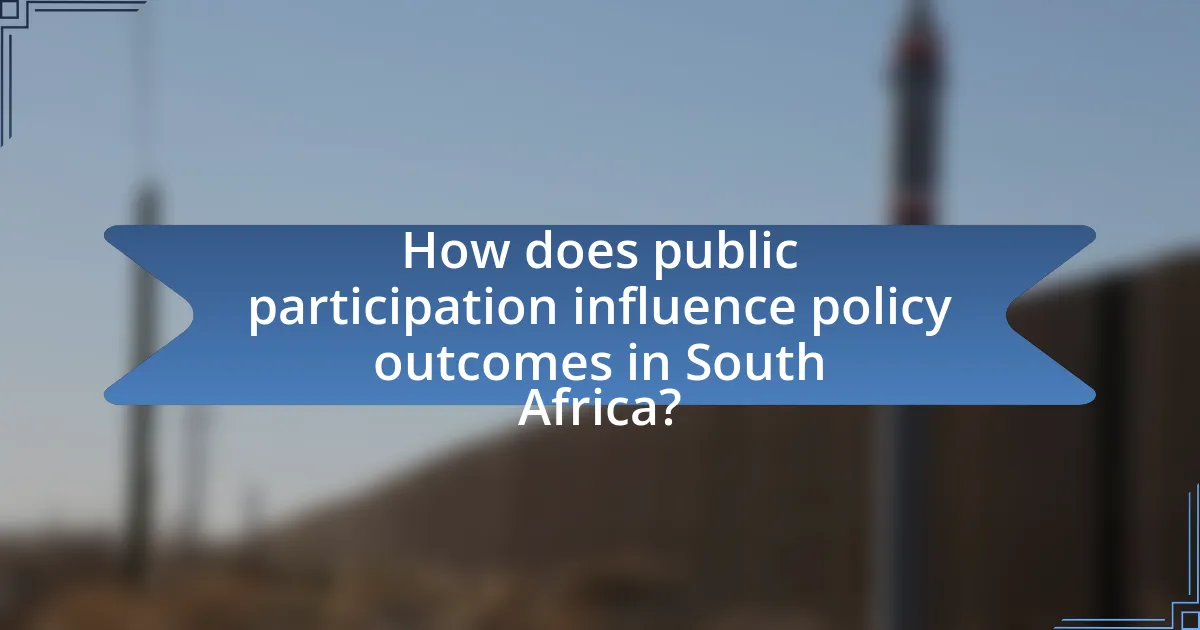
How does public participation influence policy outcomes in South Africa?
Public participation significantly influences policy outcomes in South Africa by enhancing democratic governance and ensuring that policies reflect the needs and preferences of citizens. This influence is evident through mechanisms such as public consultations, community meetings, and participatory budgeting, which allow citizens to voice their opinions and contribute to decision-making processes. For instance, the South African Constitution mandates public involvement in governance, which has led to policies that address local issues more effectively, as seen in the Integrated Development Plans (IDPs) that incorporate community input. Research by the Human Sciences Research Council indicates that when citizens engage in policy discussions, it leads to more responsive and accountable governance, ultimately resulting in policies that better serve the public interest.
What are the impacts of public participation on policy effectiveness?
Public participation significantly enhances policy effectiveness by fostering greater transparency, accountability, and inclusiveness in the decision-making process. When citizens engage in policy discussions, their diverse perspectives lead to more informed and relevant policies that reflect the needs and priorities of the community. Research indicates that policies developed with public input are more likely to gain public support and compliance, as seen in South Africa’s participatory budgeting initiatives, which have resulted in improved resource allocation and community satisfaction. Furthermore, studies show that public participation can reduce conflicts and increase trust in government institutions, ultimately leading to more sustainable and effective policy outcomes.
How does public feedback shape policy decisions?
Public feedback significantly shapes policy decisions by providing policymakers with insights into the needs and preferences of the community. This engagement allows for the identification of issues that may not be apparent through traditional data sources. For instance, in South Africa, public consultations and feedback mechanisms have been mandated in various legislative frameworks, such as the Municipal Systems Act of 2000, which requires local governments to involve citizens in decision-making processes. This legal requirement ensures that policies reflect the collective voice of the community, leading to more effective and accepted governance. Furthermore, studies have shown that policies developed with public input are more likely to achieve successful implementation and compliance, as they are tailored to the specific context and concerns of the population.
What examples illustrate successful public participation in policy making?
Successful public participation in policy making is illustrated by the South African National Development Plan (NDP) and the Integrated Development Plans (IDPs) implemented by municipalities. The NDP, developed through extensive consultations with various stakeholders, including civil society and business, aimed to address national challenges and set a vision for 2030. This participatory approach was validated by the inclusion of diverse perspectives, which helped to create a more comprehensive and inclusive policy framework. Similarly, IDPs require local governments to engage communities in the planning process, ensuring that local needs and priorities are reflected in development initiatives. The effectiveness of these participatory mechanisms is evidenced by increased community satisfaction and improved service delivery outcomes in various municipalities.
What challenges does public participation face in South Africa?
Public participation in South Africa faces significant challenges, including socio-economic disparities, lack of awareness, and institutional barriers. Socio-economic disparities hinder marginalized communities from engaging effectively in public processes, as they often lack the resources and time to participate. Additionally, a lack of awareness about rights and processes limits citizen involvement, with many individuals unaware of how to engage with policy-making. Institutional barriers, such as bureaucratic inefficiencies and inadequate communication from government entities, further obstruct meaningful participation. These challenges are documented in studies, such as the “State of Local Governance in South Africa” report by the South African Local Government Association, which highlights the need for improved engagement strategies to enhance public participation.
What barriers hinder effective public engagement in policy processes?
Barriers that hinder effective public engagement in policy processes include lack of access to information, limited awareness of policy issues, and inadequate communication channels. For instance, many citizens in South Africa may not have access to relevant data or understand the complexities of policy proposals, which can lead to disengagement. Additionally, language barriers and socio-economic disparities further exacerbate the challenge, as marginalized communities often lack the resources to participate meaningfully. Research by the South African Human Sciences Research Council highlights that these factors contribute to a significant gap in public involvement, ultimately affecting the quality and inclusiveness of policy-making.
How do socio-economic factors affect public participation?
Socio-economic factors significantly influence public participation by determining individuals’ access to resources, information, and opportunities for engagement. For instance, individuals from higher socio-economic backgrounds often have greater access to education and networks, enabling them to participate more effectively in policy discussions. Conversely, those from lower socio-economic backgrounds may face barriers such as lack of time due to work commitments, limited access to information, and fewer opportunities to engage with decision-makers. Research indicates that in South Africa, communities with higher income levels are more likely to engage in public forums and consultations, as evidenced by the 2016 South African Social Attitudes Survey, which found that 60% of individuals in higher income brackets reported participating in local governance compared to only 30% from lower income brackets. This disparity highlights how socio-economic status directly correlates with the level of public participation in policy-making processes.
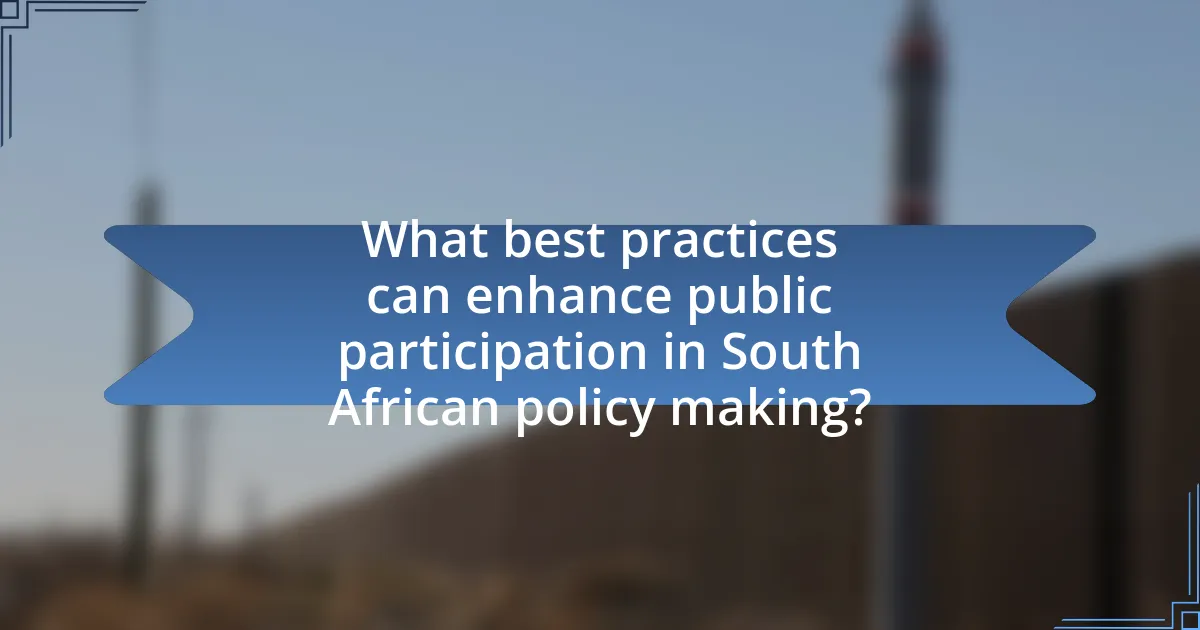
What best practices can enhance public participation in South African policy making?
Best practices that can enhance public participation in South African policy making include fostering transparency, utilizing technology for engagement, and ensuring inclusivity. Transparency in the policy-making process allows citizens to understand how decisions are made, which builds trust and encourages participation. For instance, the South African government has implemented the Promotion of Access to Information Act, which mandates the disclosure of information, thereby promoting accountability.
Utilizing technology, such as online platforms for public consultations and feedback, can significantly increase participation rates. The use of social media and dedicated websites for policy discussions has been shown to engage a broader audience, particularly younger demographics. Research indicates that digital engagement tools can enhance the reach and effectiveness of public participation efforts.
Ensuring inclusivity by actively reaching out to marginalized communities is crucial. This can be achieved through targeted outreach programs and community workshops that address the specific needs and concerns of diverse groups. The South African Constitution emphasizes the importance of public participation, and initiatives that reflect this commitment can lead to more representative and effective policy outcomes.
How can technology improve public participation efforts?
Technology can improve public participation efforts by enhancing accessibility, facilitating communication, and enabling real-time feedback. Digital platforms, such as social media and dedicated apps, allow citizens to engage with policymakers more easily, breaking down geographical barriers and increasing participation rates. For instance, a study by the World Bank found that online consultations can increase public engagement by up to 50%, demonstrating the effectiveness of technology in reaching a broader audience. Additionally, tools like surveys and polls can provide immediate insights into public opinion, allowing for more responsive and informed decision-making in policy processes.
What role do social media platforms play in facilitating engagement?
Social media platforms play a crucial role in facilitating engagement by providing accessible channels for communication and interaction among citizens, policymakers, and stakeholders. These platforms enable real-time discussions, feedback, and the sharing of information, which enhances public participation in the policymaking process. For instance, a study by the Pew Research Center found that 69% of adults in South Africa use social media, allowing for widespread dissemination of policy-related information and fostering community dialogue. This increased connectivity empowers individuals to voice their opinions, mobilize support for initiatives, and hold authorities accountable, thereby strengthening democratic processes.
How can online tools be utilized for broader participation?
Online tools can be utilized for broader participation by facilitating accessible communication and engagement platforms for diverse populations. These tools, such as social media, online surveys, and interactive websites, enable citizens to express their opinions, provide feedback, and engage in discussions regarding policy-making processes. For instance, the use of platforms like Facebook and Twitter allows for real-time interaction and mobilization of community members, while online surveys can gather data from a wider audience, ensuring that various perspectives are considered. Research indicates that digital engagement can increase participation rates significantly; a study by the Pew Research Center found that 69% of adults in South Africa use social media, highlighting the potential for these tools to reach a large segment of the population.
What strategies can be implemented to overcome participation challenges?
To overcome participation challenges in South African policy making, strategies such as enhancing accessibility, fostering trust, and utilizing technology can be implemented. Enhancing accessibility involves simplifying processes and providing resources in multiple languages to ensure all community members can engage effectively. Fostering trust can be achieved through transparent communication and consistent follow-up on public input, which encourages ongoing participation. Utilizing technology, such as online platforms for feedback and virtual meetings, can broaden participation by reaching individuals who may not attend in-person events. These strategies are supported by research indicating that inclusive practices lead to higher engagement rates and more representative policy outcomes.
How can education and awareness campaigns promote public involvement?
Education and awareness campaigns can promote public involvement by informing citizens about their rights and responsibilities in the policy-making process. These campaigns enhance understanding of relevant issues, enabling individuals to engage meaningfully in discussions and decision-making. For instance, a study by the South African Human Sciences Research Council found that communities with access to educational resources about local governance were 40% more likely to participate in public meetings. This demonstrates that well-structured campaigns can effectively mobilize citizens, fostering a more informed and active public that contributes to policy development.
What collaborative approaches can strengthen community engagement?
Collaborative approaches that can strengthen community engagement include participatory budgeting, community-led initiatives, and stakeholder partnerships. Participatory budgeting allows community members to have a direct say in how public funds are allocated, fostering a sense of ownership and accountability. Community-led initiatives empower residents to identify and address local issues, enhancing their investment in outcomes. Stakeholder partnerships, involving government, non-profits, and local organizations, facilitate resource sharing and collective problem-solving, which has been shown to increase civic participation and trust in public institutions. Research indicates that these approaches lead to more effective policy outcomes and greater community satisfaction, as evidenced by case studies in South Africa where increased public participation has resulted in improved service delivery and community resilience.
What are the future prospects for public participation in South African policy making?
The future prospects for public participation in South African policy making are promising, driven by increasing digital engagement and legislative frameworks that support citizen involvement. The South African government has implemented policies such as the Promotion of Access to Information Act and the Municipal Systems Act, which encourage public input in decision-making processes. Additionally, the rise of social media and online platforms facilitates broader participation, allowing citizens to engage with policy issues more effectively. Studies indicate that enhanced public participation can lead to more responsive governance and improved policy outcomes, as seen in various local government initiatives that have successfully integrated community feedback into their planning processes.
How can ongoing reforms improve public participation frameworks?
Ongoing reforms can improve public participation frameworks by enhancing transparency, accessibility, and inclusivity in the policymaking process. These reforms often involve the implementation of digital platforms that facilitate easier access to information and opportunities for engagement, thereby allowing a broader segment of the population to participate. For instance, the South African government has introduced initiatives like the National Development Plan, which emphasizes citizen involvement in governance. Research indicates that increased public engagement leads to more representative decision-making and better policy outcomes, as seen in various participatory budgeting projects across the country.
What role will civil society organizations play in future policy making?
Civil society organizations will play a crucial role in future policy making by acting as intermediaries between the government and the public, ensuring that diverse voices are heard in the decision-making process. These organizations will facilitate public engagement, advocate for marginalized communities, and provide expertise on social issues, thereby enhancing the democratic process. For instance, the South African Constitution emphasizes the importance of public participation in governance, which civil society organizations actively promote through campaigns and community mobilization efforts. Their involvement is essential for creating policies that reflect the needs and priorities of the population, ultimately leading to more equitable and effective governance.
What practical steps can individuals take to engage in public participation?
Individuals can engage in public participation by attending community meetings and forums where policy discussions occur. Actively participating in these gatherings allows individuals to voice their opinions and influence decision-making processes. Additionally, individuals can submit written comments on proposed policies or legislation, ensuring their perspectives are considered in official records. Joining local advocacy groups or organizations focused on specific issues enhances collective efforts to impact policy. Utilizing social media platforms to raise awareness and mobilize support for public issues also fosters engagement. Research indicates that communities with higher public participation rates experience more effective governance and policy outcomes, highlighting the importance of individual involvement in the democratic process.
